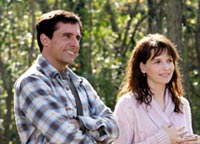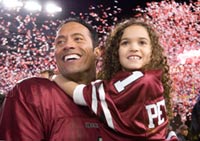Change happens. How we handle it can determine how successful—or scary—our lives turn out to be. These four fall films are about characters who seem to have things pretty well figured out, until they suddenly find themselves in an unexpected situation, governed by a whole new set of rules. How do they adjust? What do they discover about themselves and others? And do they discover it in time to save their family, the world, or the geek house?


"Dan in Real Life" stars Steve Carell in a refreshing film about an extended family that gathers each summer in a house at the shore—refreshing because the family members are not idiots or psychopaths. Instead, they're lovable, meddling, infuriating folks like us and our families.
The story focuses on Dan, a widowed father of three girls, who falls in love for the first time since his wife's death. Unfortunately, the woman he falls for turns out to be his brother's new girlfriend, and she is coming to spend a week with the family at the beach house. As Dan's life and emotions are wrested from his control, he learns, among other things, to give his girls more space and trust. The laughs were mostly laughs of recognition, as the audience saw themselves in situations arising from dealing with parents and grown or growing children.
"Dan in Real Life," rated PG-13, is a "relationship movie," and my 10-year-old daughter enjoyed it a lot. It's a sweet film that reminds you that families, while exasperating, are ultimately worth the trouble.


What is it with Amanda Bynes and updating of classic stories? First she took on Shakespeare's Twelfth Night in "She's the Man," and now she's tackling…Snow White and the Seven Dwarfs? The only problem with both these films is that they're "hmm, interesting idea" films, rather than must-see movies.
"Sydney White" is enjoyable, if not outstanding, entertainment. The young woman of the title lost her mother at a young age, and was very successfully raised by her construction worker father and his cronies. This girl can wield a wrench. However, her dear, departed mom was an enthusiastic sorority sister, so when it comes time for college, tomboy Sydney heads for mom's alma mater, rushing her sorority as a legacy.
The problem she faces is the malicious queen bee who is sorority president. The most amusing part of the film is watching how the children's story morphs into the teen film: the "mirror on the wall" becomes a "Who's Hot?" website; the seven dwarfs become seven dorks, and the handsome prince becomes Tyler Prince, president of the brother fraternity. (The best bit is what the dorks do with the refrain, "Heigh Ho," but I'm not telling!)
The story is more nuanced than I expected, and, with the exception of the sorority president, the film's point is that people can't be stereotyped, but are fun, complicated individuals.
None of the kids with whom I saw the film were familiar with the Greek system on campus, so that part had to be explained afterwards. But they all know "Snow White," so the movie held their attention. It was clear they got the interpersonal dynamics. Rated PG-13, it's an enjoyable film for a rainy day.

"The Seeker" seems to prove the adage "you can't judge a book by its movie." Avid readers are willing to classify the book series by Susan Cooper on which "The Seeker" is based with "Narnia," "Lord of the Rings," and even "Harry Potter."
You sure can't tell from the movie.
I would go into the theological and philosophical problems I had with the film, except those points are moot: the film was damned by the worst sin of moviemaking—it was deadly dull. Not laughably bad, but it could be the basis of a course in how not to write a screenplay.
A boy, Will, turns eleven to discover he is the Seeker, the only one who can save the world from the Darkness. To do so, he has to find five signs. The movie consists of will's going through his town until a sign lights up, and he is thrown back through time to get it. The ending is easy to figure out from the beginning of the film.
There's nothing really objectionable in the film, which is rated PG. The younger kids I took were enthralled, the older ones were bored silly. If your children really want to rent it, fine, just make sure you've got something else to do.


There are three reasons "The Game Plan" works when other comedies in this genre (manly single man suddenly saddled with a small child) do not. The first is Dwayne "The Rock" Johnson. He's not only good-looking and a passable actor, but he's a man with whom you'd actually consider leaving your child. (Vin Diesel and Jesse Ventura, not so much—sorry, guys.) He seems level-headed and basically decent, even if, according to the story, he's enjoying his NFL-star-salary and smorgasbord of babes. You can tell from the beginning that underneath is a reform-able guy. He's fun to watch.
Second is young Peyton Kelly. I was a little leery going in, as I'd only seen the young actress (she's currently 9 years old) doing very broad comedy on the Disney Channel's "Corey in the House." But she was able to hold her own with Dwayne, and even show some nuanced acting chops. You liked the little girl she was playing.
Finally, the script. The story was charming. Not inspired, not classic, but certainly charming. I was struck that the audience with whom I saw the film was the most racially diverse and gender-balanced I'd seen recently. Apparently it had football and babes to make it safe for the men and boys, and ballet, a cute child, and a redeemed bad boy for the girls and women. Put it together, and "The Game Plan" is a winner for family viewing.

